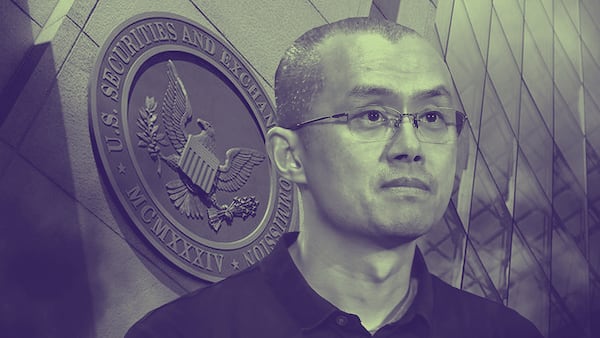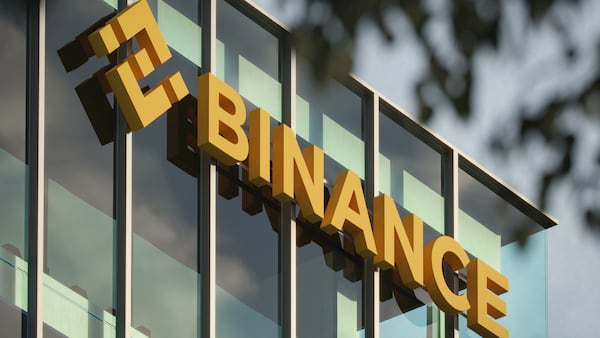- If criminal charges are leveled against Binance, it could have a major impact on crypto markets.
- Binance, which is already being sued by the CFTC and the SEC, is preparing for an extended period of legal battles.
- A criminal case would take longer to put together because the standards differ from those of a civil case.
An overarching question lingers behind the steady drip of Binance legal developments: Will the world’s largest crypto exchange, and its founder, be criminally indicted in the US?
Even as attention turns to the trial of Sam Bankman-Fried set to open in Manhattan next week, crypto investors are keeping watch on what the feds do next with Binance.
Ever since US regulators sued Binance, its US affiliate and its CEO Changpeng Zhao earlier this year for allegedly running an illegal exchange, broker-dealer, and clearing house, legal experts and media reports have indicated that the US Justice Department may follow suit with criminal charges.
If the fall of FTX wasn’t damaging enough, the potential poleaxing of Binance — an exchange with 150 million customers and $76 billion in daily trading volume — would be cataclysmic.
When FTX went sideways in November, Bitcoin shed a quarter of its value in three days.
Binance represents a substantially larger share of the crypto trading market than Bankman-Fried’s failed crypto empire.
There would undoubtedly be major carnage, said Yiannis Giokas, senior director of product innovation for Moody’s Analytics.
While Bitcoin, Ether, and stablecoins would probably survive a Binance indictment, other less widely held digital assets could be wiped out, Giokas said.
‘If anything was to happen to an entity of that size, most likely that would have a cascading effect on tokens or crypto and not necessarily on other products that are used for more straightforward use cases.’
— Moody's Analytics' Yiannis Giokas
“If anything was to happen to an entity of that size, most likely that would have a cascading effect on tokens or crypto and not necessarily on other products that are used for more straightforward use cases,” Giokas told DL News.
Preparing for battle
While charges may or may not not be handed down by a federal grand jury, Binance appears to be girding for a prolonged period of legal combat.
The company has hired a slew of former officials from the US Treasury Department, the Internal Revenue Service, and other agencies to beef up its legal compliance operations.
And on Thursday, Binance agreed to sell its Russian unit to a new centralised crypto exchange called CommEX. In a news release, Binance said that over the next several months, it plans to end all business services in Russia.
“Operating in Russia is not compatible with Binance’s compliance strategy,” said Noah Perlman, Binance’s chief compliance officer and former global head of Morgan Stanley’s financial crimes unit, in the statement.
Zhao, who is known as CZ, and the rest of Binance’s top brass may be worried that a grand jury is examining whether it violated sanctions in its dealings with Russia and other pariah states.
‘Sanctioned entities using company systems to move monies or make payments is certainly a top enforcement priority.’
— Former federal prosecutor Luke Cass
“Sanctioned entities using company systems to move monies or make payments is certainly a top enforcement priority,” Luke Cass, a former federal prosecutor who specialised in white collar criminal cases, told DL News. “It’s on the radar more than it ever has been.”
In its complaint filed against the company and Zhao in March, the Commodity Futures Trading Commission alleges that Binance directors and employees “acknowledged potentially illegal activities” involving Hamas, the Palestinian group that is designated a terrorist organisation by the US State Department and is the subject of sanctions.
The CFTC suggests that Binance and its officers looked the other way on activity involving sanctioned entities.
In February 2019, Samuel Lim, Binance’s then-chief compliance officer, received information “regarding Hamas transactions,” according to the complaint. In response, Lim told a colleague that terrorists usually send “small sums,” as “large sums constitute money laundering.”
The following year, Lim, who is named as a defendant in the CFTC suit, allegedly told compliance colleagues Russian customers “are here for crime.”
Another Binance employee agreed that “we see the bad, but we close 2 eyes,” the complaint says.
Binance, Zhao, and Lim have denied the allegations made by the CFTC and asked a court to dismiss the suit.
The US Securities and Exchange Commission filed its own lawsuit in June, alleging Binance and Zhao raked in $11.6 billion in revenue from US customers even though it was unlicensed, and that the company and its US affiliate redirected billions of customer assets to investment funds controlled by Zhao.
Those charges echoed accusations made against FTX and Bankman-Fried.
Binance and Zhao have denied the allegations in that suit as well.
Binance did not respond to a request for comment about whether it was concerned about a possible criminal indictment.
A potential criminal case
Meanwhile, the crypto community is waiting for the next shoe to drop.
According to multiple media reports, US prosecutors have been investigating Binance for some time.
Legal experts say there’s a raft of reasons why it may be taking awhile for prosecutors to either end their case or ask a grand jury for an indictment.
For starters, cases can slow to a crawl when there are multiple agencies involved. As regulators, the SEC and CFTC do not have the authority to pursue criminal cases, so they file civil actions against their targets.
In instances when the wrongdoing may rise to a criminal level, the agencies refer cases to their colleagues at the Justice Department, and they tend to take control by tapping the FBI to gather evidence and presenting it to a grand jury.
Britt Biles, a former assistant chief litigation counsel at the SEC, said prosecutors may be keen to work more in tandem with the agency on crypto cases.
In the past, the SEC would “take a back seat” to criminal investigations, Biles, now a partner at the law firm Womble Bond Dickinson, told DL News.
“But they’re increasingly letting the SEC get ahead of or work in parallel with criminal cases,” she said.
Another reason criminal cases may take longer to develop is the burden of proof prosecutors must meet to win a verdict.
In civil cases, the government must prove its case with a “preponderance of evidence,” meaning there’s enough to tip the scales against the defendant, Cass said.
In criminal matters, a jury must unanimously find the defendant guilty “beyond a reasonable doubt.”
The upshot: Prosecutors may take extra time to amass as much evidence as possible to improve their chances of clearing that hurdle.
“The standards are very different,” said Cass, an adjunct professor at Georgetown University’s Law Center.
Criminal indictments are “unpredictable,” said John Reed Stark, a former SEC enforcement lawyer and cybercrime specialist.
“I don’t think there’s any standard analysis for when the criminal folks are going to prosecute,” said Stark, citing reasons including whether prosecutors think there’s enough evidence and how time-consuming cross-agency and cross-border investigations can be.
As Bankman-Fried takes his place at the defendant’s table in the federal courthouse on Foley Square in Lower Manhattan on Tuesday, a jury and the rest of the world will get to comb through every scrap of evidence mustered by the government.
Even so, crypto investors are likely to keep one eye cocked on a potential sequel, starring Zhao.


